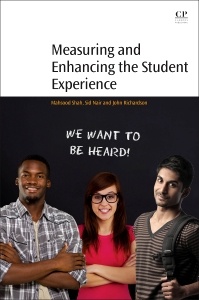Description
Measuring and Enhancing the Student Experience
Authors: Shah Mahsood, Nair Chenicheri Sid, Richardson John
Language: English
Subject for Measuring and Enhancing the Student Experience:
Keywords
Academic leadership; Australian Graduate Survey; Australian Universities Quality Agency (AUQA)Student experience; CEQ; CEQuery software; Closing the loop; Course Experience Questionnaire (CEQ)Government funding; Enhancement of student experience; Evaluations; External quality agencies; External quality audits; Feedback strategies; First-year experience; Good practice database; Government policy; Higher-education policy; Implementation of improvements; Improvement framework; Keyword; Learning analytics; Monitoring; Non-response; Non-traditional student; Online learning technologies; Online surveys; Open-ended comments; Optimal survey outcomes; Paper-based surveys; Performance development and review (PDR)Performance funding; Performance measures; Qualitative feedback; Quality assurance; Quality audits; Quality improvement; Quality indicators; Response rate; Response rates; Staff engagement; Student communication; Student diversity; Student engagement; Student evaluation; Student expectations; Student experience and improvement; Student experience; Student feedback; Student insights; Student participation in quality assurance; Student retention; Student survey framework; Student survey; Student surveys; Student voice; Students; Teacher evaluations; Tertiary Education Quality and Standards Agency (TEQSA)Transnational education; Tertiary education; Transnational programmes/partnerships; Unit/subject evaluations
63.97 €
In Print (Delivery period: 14 days).
Add to cartSupport: Print on demand
Description
/li>Contents
/li>Biography
/li>Comment
/li>
Measuring and Enhancing the Student Experience provides insights on how student experiencemeasures could be used to inform improvements at institutional, course, unit of study and teacherlevel. The book is based on a decade of research and practitioner views on ways to enhance thedesign, conduct, analysis, reporting and closing the loop on student feedback data. While the bookis largely based on Australian case studies, it provides learning experiences for other countries wherestudent experience measures are used in national and institutional quality assurance. Consisting of 13chapters, the book includes a wide range of topics including the role and purpose of student feedback,the use of student feedback in staff performance reviews, staff and student engagement, a studentfeedback and experience framework, the first year experience, use of qualitative data, engagingtransnational students in feedback, closing the loop on feedback, student engagement in nationalquality assurance, use of learning analytics and the future of the student experience.
Mahsood Shah is an Associate Professor and Deputy Dean (Learning and Teaching) with School ofBusiness and Law at CQUniversity, Australia. In this role Mahsood is responsible for enhancing theacademic quality and standard of courses. Mahsood is also responsible for learning and teachingstrategy, governance, effective implementation of policies, and enhancement of learning and teachingoutcomes across all campuses. In providing leadership for learning and teaching, Mahsood workswith key academic leaders across all campuses to improve learning and teaching outcomes of coursesdelivered in various modes including face-to-face and online. At CQUniversity, he provides leadershipin national and international accreditation of academic courses.
Mahsood is also an active researcher. His areas of research include quality in higher education,measurement and enhancement of student experience, student retention and attrition, studentengagement in quality assurance, international higher education, widening participation and privatehigher education.
Chenicheri Sid Nair is the incoming Executive Director, Tertiary Education Commission (TEC), Mauritius.Prior to joining TEC, he was Professor, Higher Education Development at the University of WesternAustralia (UWA), Perth where his work encompassed the improvement of the institutions teachingand learning. Before this appointment to UWA, he was Quality Adviser (Research and Evaluation) inthe Centre for Higher Education Quality (CHEQ) at Monash University, Australia. He has an extensiveexpertise in the area of quality development and evaluation, and he also has considerable editorialexperience. Currently, he is Associate Editor of the International Journal of Quality Assurance inEngineering and Technology Education (IJQAETE). He was also a Managing Editor of the ElectronicJournal of Science Education (EJSE). Professor Nair is also an international consultant in a number ofcountries in quality, student voice and evaluations.
Chapter 1. Measuring the Student Experience: For Whom and For What Purpose?
Chapter 2. Student Feedback: The Loophole in Government Policy
Chapter 3. Student Feedback: Shifting Focus From Evaluations to Staff Performance Reviews
Chapter 4. Why Should I Complete a Survey? Non-responses With Student Surveys
Chapter 5. Engaging Students and Staff in Feedback and Optimising Response Rates
Chapter 6. A Student Feedback and Experience Framework
Chapter 7. Measuring the Expectations and Experience of First-Year Students
Chapter 8. Accessing Student Voice: Using Qualitative Student Feedback
Chapter 9. Engaging Transnational Students in Quality Assurance and Enhancement
Chapter 10. Closing the Loop: An Essential Part of Student Evaluations
Chapter 11. Student Engagement in National Quality Assurance
Chapter 12. Using Learning Analytics to Assess Student Engagement and Experience
Chapter 13. Measurement and Enhancement of Student Experience: What Next?
Professor Sid Nair is currently Executive Dean and Dean Learning, Teaching and Student Experience at the Victorian Institute of Technology (VIT), Australia where he is responsible for the learning, teaching, student experience and quality matters of the Institution.
Previous to this appointment at VIT, Sid was the Executive Director of the Tertiary Education Commission (TEC), Mauritius, the apex regulatory body where he was responsible for the formulation and execution of strategies, policies and procedures in the higher education sector in Mauritius.
Prior to joining TEC, he was Professor of Higher Education Development at the Centre for Education Futures (CEF), University of Western Australia. His role was to build the capacity of academics in the digital delivery of their teaching. His career path also had him as Interim Director and Quality Advisor (Evaluations and Research) at the Centre for Higher Education Quality (CHEQ) at Monash University, Australia where he headed the evaluation unit at Monash University. In this capacity he restructured the evaluation framework at the university. The approach to evaluations at Monash has been noted in the first round of the Australian Unive
- Provides both practical experience and research findings
- Presents a diverse range of topics, ranging from broader student experience issues, analysis of government policies in Australia on student experience, the changing context of student evaluations, nonresponse to surveys, staff and student engagement, ideal frameworks for student feedback, and more
- Contains data taken from the unique Australian experience with changing government policies and reforms relevant to the Asia-Pacific region




